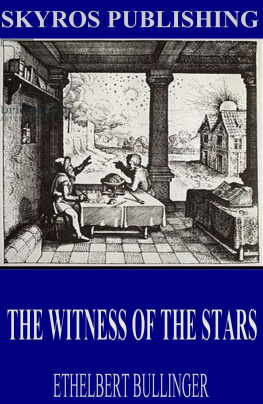Sir Robert Anderson - The Coming Prince
Here you can read online Sir Robert Anderson - The Coming Prince full text of the book (entire story) in english for free. Download pdf and epub, get meaning, cover and reviews about this ebook. year: 2018, publisher: Charles River Editors, genre: Religion. Description of the work, (preface) as well as reviews are available. Best literature library LitArk.com created for fans of good reading and offers a wide selection of genres:
Romance novel
Science fiction
Adventure
Detective
Science
History
Home and family
Prose
Art
Politics
Computer
Non-fiction
Religion
Business
Children
Humor
Choose a favorite category and find really read worthwhile books. Enjoy immersion in the world of imagination, feel the emotions of the characters or learn something new for yourself, make an fascinating discovery.
- Book:The Coming Prince
- Author:
- Publisher:Charles River Editors
- Genre:
- Year:2018
- Rating:5 / 5
- Favourites:Add to favourites
- Your mark:
- 100
- 1
- 2
- 3
- 4
- 5
The Coming Prince: summary, description and annotation
We offer to read an annotation, description, summary or preface (depends on what the author of the book "The Coming Prince" wrote himself). If you haven't found the necessary information about the book — write in the comments, we will try to find it.
Skyros Publishing is dedicated to reproducing the finest books ever written and letting readers of all ages experience a classic for the first time or revisit a past favorite.
Sir Robert Anderson was a British intelligence officer and theologian. Andersons most famous work is The Coming Prince which is a detailed book on Daniels Seventieth Week and the Antichrist.
The Coming Prince — read online for free the complete book (whole text) full work
Below is the text of the book, divided by pages. System saving the place of the last page read, allows you to conveniently read the book "The Coming Prince" online for free, without having to search again every time where you left off. Put a bookmark, and you can go to the page where you finished reading at any time.
Font size:
Interval:
Bookmark:
THE COMING PRINCE HAS BEEN out of print for more than a year; for it seemed inadvisable to reissue it during the War. But the War has apparently created an increased interest in the prophecies of Daniel; and as this book is therefore in demand, it has been decided to publish a new edition without further delay. Not that these pages contain any sensational Armageddon theories. For a place called in the Hebrew tongue Armageddon is situated neither in France nor in Flanders, but in Palestine; and the future of the land and people of the covenant will be a main issue in the great battle which is yet to be fought on that historic plain.
Prophetic students are apt to become adherents of one or other of two rival schools of interpretation. The teaching of the futurists suggests that this Christian dispensation is altogether a blank in the Divine scheme of prophecy. And the historicists discredit Scripture by frittering away the meaning of plain words in order to find the fulfillment of them in history. Avoiding the errors of both these schools, this volume is written in the spirit of Lord Bacons dictum, that Divine prophecies have springing and germinant accomplishment throughout many ages, though the height or fullness of them may belong to some one age. And this world war is no doubt within the scope of prophecy, though it be not the fulfillment of any special Scripture.
Very many years ago my attention was directed to a volume of sermons by a devout Jewish Rabbi of the London Synagogue, in which he sought to discredit the Christian interpretation of certain Messianic prophecies. And in dealing with Daniel 9., he accused Christian expositors of tampering, not only with chronology, but with Scripture, in their efforts to apply the prophecy of the Seventy Weeks to the Nazarene. My indignation at such a charge gave place to distress when the course of study to which it led me brought proof that it was by no means a baseless libel. My faith in the Book of Daniel, already disturbed by the German infidel crusade of the Higher Criticism, was thus further undermined. And I decided to take up the study of the subject with a fixed determination to accept without reserve not only the language of Scripture, but the standard dates of history as settled by our best modern chronologists. [ 1 ]
The following is a brief summary of the results of my inquiry as regards the great prophecy of the Seventy Weeks. I began with the assumption, based on the perusal of many standard works, that the era in question had reference to the seventy years of the Captivity of Judah, and that it was to end with the Coming of Messiah. But I soon made the startling discovery that this was quite erroneous. For the Captivity lasted only sixty-two years; and the seventy weeks related to the wholly different judgment of the Desolations of Jerusalem. And further, the period unto Messiah the Prince, as Daniel 9:25 so plainly states, was not seventy weeks, but 7+62 weeks.
The failure to distinguish between the several judgments of the Servitude, the Captivity and the Desolations, is a fruitful source of error in the study of Daniel and the historical books of Scripture. And it is strange that the distinction should be ignored not only by the Critics, but by Christians. Because of national sin, Judah was brought under servitude to Babylon for seventy years, this was in the third year of King Jehoiakim (B.C. 606). But the people continued obdurate; and in B.C. 598 the far severer judgment of the Captivity fell on them. On the former capture of Jerusalem, Nebuchadnezzar left the city and people undisturbed, his only prisoners being Daniel and other cadets of the royal house. But on this second occasion he deported the mass of the inhabitants to Chaldea. The Jews still remained impenitent, however, in spite of Divine warnings by the mouth of Jeremiah in Jerusalem and Ezekiel among the exiles; and after the lapse of another nine years, God brought upon them the terrible judgment of The Desolations, which was decreed to last for seventy years. Accordingly in B.C. 589, the Babylonian armies again invaded Judea, and the city was devastated and burned.
Now both the Servitude and the Captivity, ended with the decree of Cyrus in B.C. 536, permitting the return of the exiles. But as the language of Daniel 9:2 so plainly states, it was the seventy years of The Desolations that were the basis of the prophecy of the seventy weeks. And the epoch of that seventy years was the day on which Jerusalem was invested the tenth Tebeth in the ninth year of Zedekiah a day that has ever since been observed as a fast by the Jews in every land. (2 Kings 25:1.) Daniel and Revelation definitely indicate that the prophetic year is one of 360 days. Such moreover was the sacred year of the Jewish calendar; and, as is well known, such was the ancient year of Eastern nations. Now seventy years of 360 days contains exactly 25, 200 days; and as the Jewish New Years day depended on the equinoctial moon, we can assign the 13th December as the Julian date of tenth Tebeth 589. And 25, 200 days measured from that date ended on the 17th December 520, which was the twenty-fourth day of the ninth month in the second year of Darius of Persia -the very day on which the foundation of the second Temple was laid. (Haggai 2:18, 19.)
Here is something to set both critics and Christians thinking. A decree of a Persian king was deemed to be divine, and any attempt to thwart it was usually met by prompt and drastic punishment; and yet the decree directing the rebuilding of the Temple, issued by King Cyrus in the zenith of his power, was thwarted for seventeen years by petty local governors. How was this? The explanation is that until the very last day of the seventy years of the Desolations had expired, God would not permit one stone to be laid upon another on Mount Moriah.
Dismissing from our minds, therefore, all mere theories on this subject, we arrive at the following definitely ascertained facts:
1. The epoch of the Seventy Weeks was the issuing of a decree to restore and build Jerusalem. (Daniel 9:25.)
2. There never was but one decree for the rebuilding of Jerusalem.
3. That decree was issued by Artaxerxes, King of Persia, in the month Nisan in the 20th year of his reign, i.e. B.C. 445.
4. The city was actually built in pursuance of that decree.
5. The Julian date of 1st Nisan 445 was the 14th March.
6. Sixty-nine weeks of years i.e. 173, 880 days reckoned from the 14th March B.C. 445, ended on the 6th April A.D. 32.
7. That day, on which the sixty-nine weeks ended, was the fateful day on which the Lord Jesus rode into Jerusalem in fulfillment of the prophecy of Zechariah 9:9; when, for the first and only occasion in all His earthly sojourn, He was acclaimed as Messiah the Prince the King, the Son of David.
And here again we must keep to Scripture. Though God has nowhere recorded the Bethlehem birth-date of Christ, no date in history, sacred or profane, is fixed with greater definiteness than that of the year in which the Lord began His public ministry. I refer of course to Luke 3:1, 2. I say this emphatically, because Christian expositors have persistently sought to set up a fictitious date for the reign of Tiberias. The first Passover of the Lords ministry, therefore, was in Nisan A.D. 29; and we can fix the date of the Passion with absolute certainty as Nisan A.D. 32. If Jewish or infidel writers set themselves to confuse and corrupt the chronology of these periods, we would not be surprised. But it is to Christian expositors that we owe this evil work. Happily, however, we can appeal to the labors of secular historians and chronologists for proofs of the divine accuracy of Holy Scripture.
Font size:
Interval:
Bookmark:
Similar books «The Coming Prince»
Look at similar books to The Coming Prince. We have selected literature similar in name and meaning in the hope of providing readers with more options to find new, interesting, not yet read works.
Discussion, reviews of the book The Coming Prince and just readers' own opinions. Leave your comments, write what you think about the work, its meaning or the main characters. Specify what exactly you liked and what you didn't like, and why you think so.











